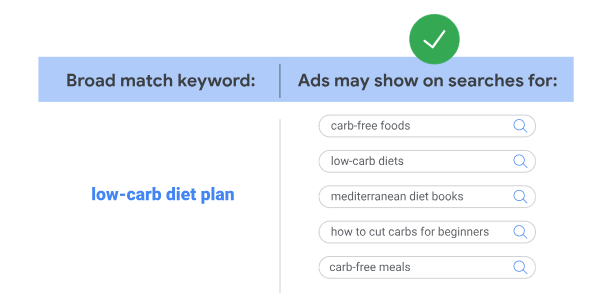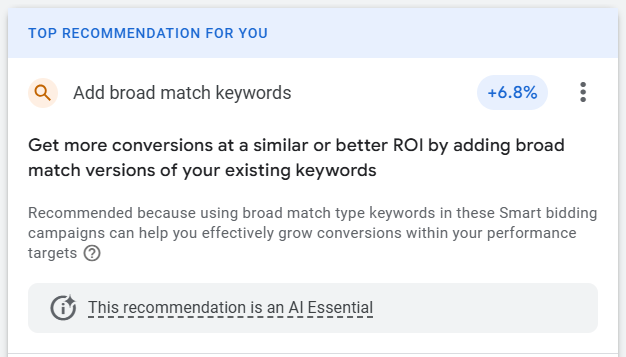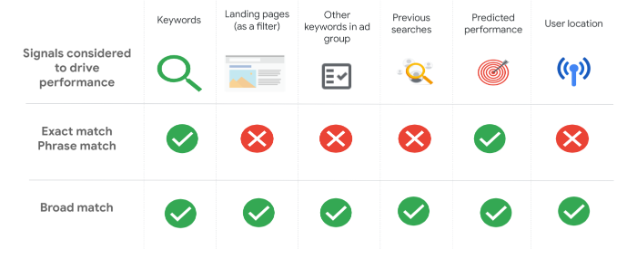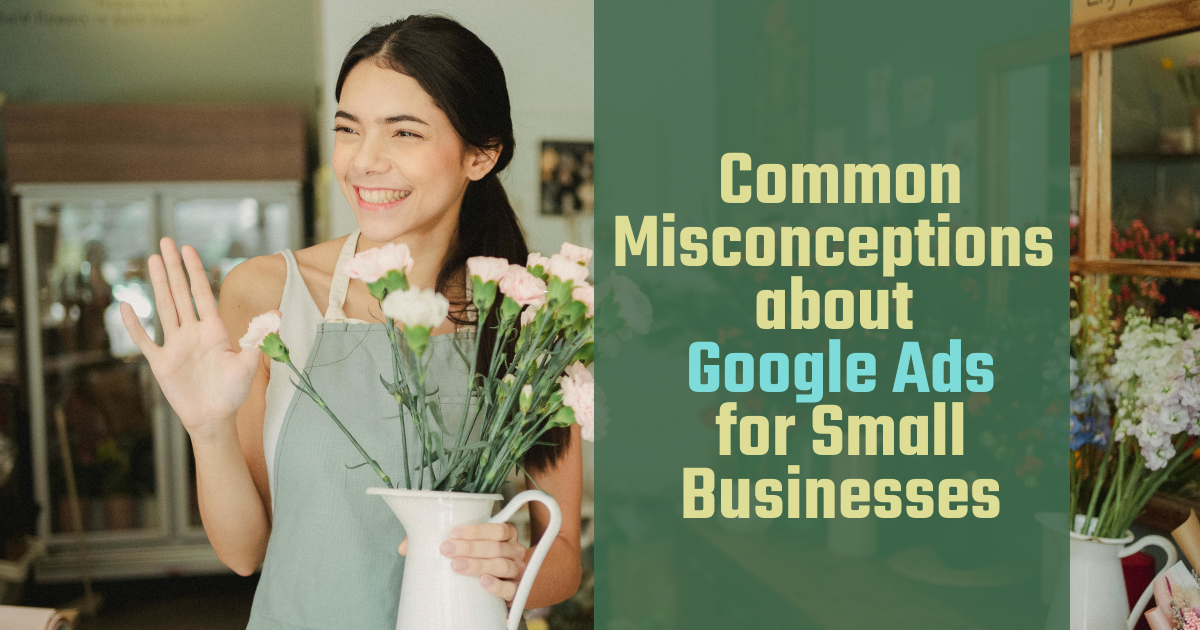Broad match keywords have long been viewed as the rotten egg of match types in Google Ads. Due to their loose keyword targeting (and the high risk of wasting money on unwanted clicks), broad match is typically recommended only for advertisers with larger budgets who want to expand their reach to wider audiences.
But continued improvements in Google’s Smart Bidding algorithm have recently changed my perspective of broad match. In this post, I share what changed my mind and how advertisers can effectively leverage broad match to lower their CPAs in some scenarios.
A broad match nightmare (or was it?)
I nearly shrieked when I opened up my client’s account. It was like entering my toddler’s playroom after a long day indoors. Over 1,500 keywords were haphazardly tossed into a single ad group like a bucket of Legos dumped across the floor.

All broad match.
All auto-apply settings enabled.
It was an absolute horror show. Except for one thing …
Conversions were humming along at an average cost of 5 bucks each. Yep, a $5 CPA. And yes, these were legitimate conversions that were valuable to the client: actual phone calls and lead-form submissions. Not a temporary fluke, either. These were consistent results, month after month, over the course of a year.
Upon seeing the mess, my initial instinct was to overhaul the entire campaign (and I did, eventually). But after closer inspection, I realized that broad match was a pivotal key to this client’s success.
I’ll come back to this in a minute. But first, let’s go over what broad match is and why it’s traditionally the target of so much hate among Google Ads managers (including myself).
What is a broad match keyword? (with example)
In Google Ads, a broad match keyword is a term that you specify should trigger your ad in Google when someone searches for those words or loosely related variations. Targeting a keyword with broad match allows your ad to show for a broad range of related searches that don’t necessarily include the exact words you specified.
Broad Match Keyword Example: If you target the keyword “web designer” with broad match in Google Ads, your ad can show for many other searches, such as “website builder app” or “digital marketing agency.”
Here’s a handy image from Google that illustrates this broad match definition:

Broad targeting leads to wasted ad spend
For most advertisers (especially those with a small budget for Google Ads), broad match is a little too loosey-goosey.
To prevent wasting your ad budget on unwanted searches, it’s generally better to use phrase match or, increasingly, exact match. That’s the best strategy to use when every single penny must go toward the keywords that are most valuable to your business. But there are some exceptions to this, as I explain below.
Why broad match gets such a bad wrap
Broad match is a tool like any other in Google Ads. It has a specific purpose, as well as advantages and disadvantages.
The issue that many of us in the PPC community have with broad match is that it’s not for everyone – but Google increasingly acts like it is.
For one, it’s the default match type. When you enter keywords in a Google Ads campaign, it’s automatically set to Broad Match, and you’re not really asked to change this setting (unless you notice the little note at the bottom about using brackets and quotations).
Frequently, inexperienced advertisers do not even realize they have other options or that their keyword targeting will be so broad. This is one of the most common mistakes I see in Google Ads and the reason why so many new campaigns fail.
My beef with broad match doesn’t end there
Increasingly, Google is aggressively pushing broad match at all stages of the campaign setup and after.
It’s pre-selected as a campaign-level setting (which then restricts the use of other match types unless you disable the setting).

It’s pushed as a Recommendation to improve your “Optimization Score” (and applied automatically if you have auto-apply enabled).

It’s pushed again whenever you add new Phrase Match or Exact Match keywords to your campaign.

Finally, PPC specialists like me are constantly bombarded with phone calls from Google’s third-party “account strategists,” whose advice always boils down to “switch to broad match! It’ll help your campaign!”

It’s frustrating, honestly, because the majority of my clients’ campaigns do not benefit from broad match. They have limited budgets, so every click needs to come from a relevant, valuable search. Often, it has felt like Google’s push for broad match is merely a ploy to convince advertisers to increase their budget. (That’s a post for another day.)
But despite these frustrations, I’ve come to realize that broad match does have unique power when implemented with a Smart Bidding strategy, such as Maximize Conversions, in certain campaigns.
What changed my mind about broad match
When I waded through my client’s messy broad match ad group, I was shocked to see that some keywords were converting for under $1, because each click only cost a few cents. Even more shocking was that these keywords were barely relevant to my client’s product.
While I can’t share the specifics of this campaign in particular, it was the equivalent of a campaign advertising “baseball tickets” but getting conversions from people searching for “baseball statistics” and “what time is the Phillies game today?”
These irrelevant searches had surprisingly high conversion rates. And yet they weren’t getting tons of clicks, so they weren’t wasting a huge chunk of my client’s ad spend.
This could only mean one thing: Google’s Smart Bidding was truly working. Ads were being shown for these broad keywords only when Google’s algorithm was certain of a high likelihood of a conversion.
That is exactly how Smart Bidding is supposed to work. And, it’s exactly what Google means it when it says “Use broad match to get more conversions at a similar or better ROI” (even though this assertion still makes me wince, in most cases).
‘It’s the [CPA], stupid’
Initially, it irked me to see all these irrelevant keywords in my client’s account, potentially eating up their budget. But after inspecting the data, I realized it didn’t totally matter.
What did I care if an irrelevant keyword was spending money if it was converting for less than a buck? If these keywords were helping lower the campaign’s average cost per conversion, why remove them?
For this particular campaign, it’s all about CPA (not ROAS, which I’ll come back to in a second). The power of Smart Bidding is helping to maximize conversions for the budget, across a very wide net of keyword targeting.
How Smart Bidding works
In Google Ads, Smart Bidding is an automated bid strategy that optimizes your bids for conversions based on a wide range of signals and historical data. Google uses contextual clues to run your ad at the right time, at the right cost, when a conversion goal is more likely to occur.
To be clear, this isn’t new. Smart Bidding has been around for a decade. But it has vastly improved over the last few years.
Some of the basic signals that Google looks at, aside from the user’s search query, are:
- User device and location
- Weekday and time of day
- Device
- Browser
- Operating system
But increasingly, Google is better-equipped to analyze more complex data, including:
- User behavior
- User browsing history
- First-party data provided by advertisers (such as remarketing lists)
The power of the algorithm

In its documentation about Smart Bidding, Google does not explicitly say that it uses a searcher’s “browsing history” as a signal for bidding. But we do know that Google’s machine learning algorithms train on data at a vast scale across the entire Google ecosystem – including its 2+ million website Display Network. So it’s very likely that Google is harnessing this data to optimize its Smart Bidding based on a wider user journey (likely in the same way it powers Performance Max campaigns).
But also — and this is extremely important — Google does tell us that broad match uses more signals for performance than other match types. One such signal is a user’s previous searches. In other words, broad match now has more power than phrase match and exact match, when it comes to Smart Bidding. This new power is often overlooked by long-time PPC specialists who don’t realize the game has fundamentally changed. (In their defense, old habits die hard!)
Believe it not, broad match has unique power
Here’s how Google describes it: “Broad match is the only match type that uses all of the signals available to understand intent and find the most relevant match that is expected to perform for you. Because exact and phrase match must adhere to additional matching requirements, they are restricted from using these additional signals.”

This is how Google can tell when someone searching for “baseball statistics” is likely to convert when showed an ad for “baseball tickets,” based on a wide array of signals. And since the keyword “baseball statistics” is not nearly as competitive to bid on as “tickets,” the CPC is much less expensive. This keeps CPCs low, generating a conversion “at a similar or better ROI” than with other, more expensive keywords.
At the end of the day, if the broadly-matched, irrelevant keyword still generates a conversion at a lower CPA than other keywords in the account, then who cares? That’s a win for the advertiser.
Very important caveats
To be clear, I’m not advocating that every advertiser switch to broad match. In fact, I still don’t recommend that any advertiser start a campaign with broad match, except as a test or when a large budget allows for more flexibility.
So here are some caveats to everything I’ve mentioned above:
1. Lead quality matters
If your conversions are leads, then broad match will inevitably generate poorer quality than exact match. My client with the messy account structure wasn’t too concerned about lead quality for this particular campaign. But the loose nature of the broad match means that this campaign is surely generating leads that don’t become actual purchases or proceed further down the funnel.
2. Consider ROAS
For now, my client is optimizing for CPA, not return on ad spend (ROAS). They want as many conversions as possible for the lowest cost. While broad match may indeed deliver decent ROAS for this campaign in the future, I suspect exact match may produce a greater return (and greater lifetime value) since the quality of the leads would be better.
3. Add negative keywords
With broad match, your new full-time job is checking the Search Terms report daily to look for unwanted searches and block them as negative keywords. It’s tedious, but critical. You shouldn’t be spending money on clicks that are completely irrelevant to your business and will never convert. (But remember that negative keyword match types in Google Ads work differently than their positive counterparts.)
4. Your niche will influence CPC and CPA
Above, I mentioned how my client was averaging $5 per conversion (some keywords as low as $1). I’m not saying this is possible for every advertiser. My client’s niche is somewhat unique and uncompetitive, allowing for cheaper CPCs, even for the most valuable terms. More competitive industries will of course cost a lot more.
5. Clean up your playroom account structure
Don’t lump all your broad match keywords into a single ad group. Yes, my client’s messy campaign had a fantastic CPA, but we were able to improve it even more by grouping the keywords into logical themes and categories. This made it much easier to identify the highest-performing groups and get rid of the duds.
When to use broad match
Even with the significant improvements in Smart Bidding, I still only recommend using broad match keywords in specific scenarios. Here are a few examples:
1) With large budgets: Midsize to enterprise businesses have a lot more room to run campaigns on broad match and test what works. For the rest of us with limited budgets, it’s important to start with Phrase or Exact Match to make every dollar count. Then, as you scale, test the waters with broad match to see how it performs.
2) With heavy-volume keywords: Even with a limited budget, broad match may be worth testing if you’re targeting keywords with heavy volume (thousands of searches per day). Greater search volume enables Google to show your ad to the users who are most likely to convert. In other words, there’s more data available to optimize the Smart Bidding.
3) For nationwide campaigns: This is essentially the same point as heavy-volume keywords. A wider geographic pool will generally translate into greater search volume. This helps Google to “pick and choose” who your ads are shown to.
4) In testing: If you’re curious if broad match will work for you, just try it. Test it with a very limited campaign to start, or even just an ad group. For some clients, I’ll add a new group with a single broad-match keyword (usually the most specific and relevant long-tail keyword that is implemented as exact match elsewhere in their campaigns – similar to an old-fashioned SKAG, but with broad match). Then, monitor closely to see how it performs.
5) For demand gen and/or when every search is valuable to you: This is usually applicable only to larger advertisers. But if you want to get your ad in front of as many people as possible in a certain category (and you want them to convert), then go for it: broad match might be your new BFF. (But if this is your goal, then you’ll probably get even better results from a Performance Max campaign.)
Conclusion
Broad match keywords are not for everyone (despite what Google insists). But in certain situations, when implemented properly with Smart Bidding, they might help to generate conversions at a similar or lower cost than the more expensive Exact match keywords in your campaign. Tread lightly, especially if your budget is limited. Most advertisers should target with Phrase or Exact match keywords to prevent wasting money on unwanted clicks. But as Google’s Smart Bidding continues to improve, Broad match could end up being more powerful than many of us previously gave it credit for.
Need a hand? Let me know.
If you need some help with your Google Ads campaigns, request pricing for a quick overview of how I can help, or email me directly at mike@marlinsem.com.






![How to Use Google Ads for Limo Services [Updated 2025]](https://marlinsem.com/wp-content/uploads/2024/01/limo-company-advertising-google-ads-2025.png)
